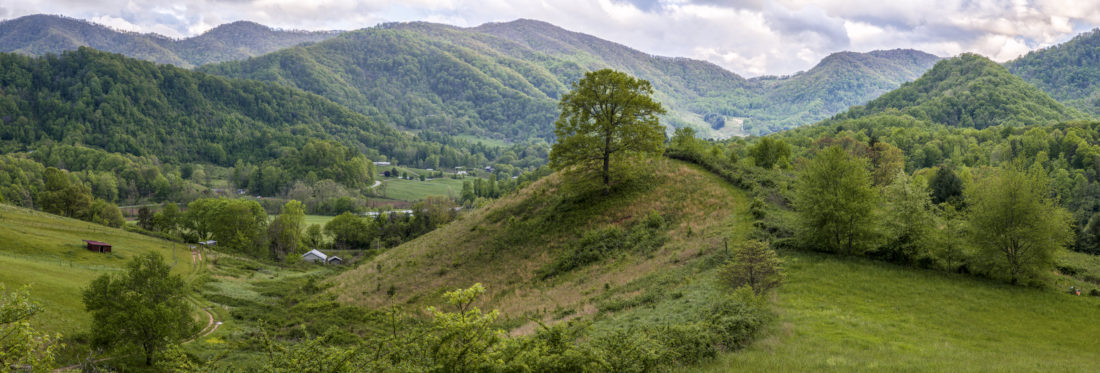Readers had a lot to say this year about a host of local issues — from our region’s growth and development to the environment, homelessness and more. In letters, commentaries and online comments, readers spoke their minds on the things that mattered to them and their community.
Your tax dollars at work

In a Jan. 19 commentary, Asheville reader Stacy Claude expressed disappointment that the Asheville City Board of Education voted to close Asheville Primary School.
“Shutting down a school is a huge move: Why was there no task force in the case of Asheville Primary?” asked Claude. “No search for solutions? No stakeholder input beyond a public hearing held with less than 24 hours’ notice that closing the school was even being considered. What’s really going on here?”
Other issues involving local government likewise caused readers to question the status quo. An Xpress story about occupancy taxes prompted Asheville reader Brandi Andrade to write in a May 25 letter: “But I am equally certain that tax should be spent on our community, not on more tourism. … I say to use the money toward food insecurity, homelessness, city cleanups and affordable housing.”
Meanwhile, a dozen readers weighed in on a pair of bond referendums totaling $70 million that proposed raising property taxes to support conservation of open space and provide more affordable housing. Most, such as state Rep. John Ager of Fairview, were in favor.
“Affordable housing needs to be available in the already built-up areas, along established road corridors and bus routes,” Ager wrote in an Oct. 19 letter. “At the same time, we need to preserve the rural landscapes that remain in our county.”
But in a Nov. 6 commentary, urban planner Joe Minicozzi urged voters to reject the bond issues: “Our wealthiest households are not paying their fair share now, and these bonds will simply add to the inequity, asking disproportionately assessed lower-income households to continue to shoulder more than their fair share of the burden,” wrote Minicozzi, whose company has analyzed the Buncombe County property tax assessment system.
In the end, voters approved both measures by margins of over 23 points.
To log or not to log
Multiple readers wrote in about the U.S. Forest Service’s plan for managing the Pisgah and Nantahala forests.
“Sadly, the U.S. Forest Service just released a 30-year plan that will quadruple logging in the Pisgah and Nantahala national forests, while reducing protections for its most important recreation and conservation areas,” wrote Katherine Pesce of Asheville in an April 11 letter. “I am one of more than 14,000 people who have objected to the forest plan.”
But commentary writer Susan Fletcher, whose family owns Canton Sawmill, offered a different point of view in a June 8 commentary, arguing that logging can be beneficial to the national forests: “We need to create healthier, more resilient forests by using our perpetual, sustainable and renewable timber resources wisely — and, much like the patchwork of a quilt, that means including varying age classes and stands.”
On another topic, Bill Branyon, who lost in the primary for a seat on the Buncombe County Board of Commissioners, prompted a flurry of responses when he called the local Sierra Club chapter “one of Buncombe County’s most destructive environmental parasites” for its political endorsement process.
“It’s become increasingly apparent to me that the lion’s share of the local Sierra Club chapter’s endorsements seem to go to incumbents, many of whom have been responsible for the most environmentally ravaging decisions I’ve seen in my 30 years of reporting on such issues,” declared Branyon in a June 29 commentary.
Pushback included a July 13 letter from local Sierra Club volunteer John Sterling, who wrote: “He heaps venomous scorn, most of it unfair and baseless, on an organization staffed exclusively by conscientious volunteers who selflessly devote their time and energy to doing what they can to preserve and protect the environment of Western North Carolina.”
By leaps and bounds
Our area’s growth and development sparked a raft of opinion pieces this year. One issue was whether Asheville City Council should approve an amendment to the city’s Unified Development Ordinance to reduce requirements for open space in large developments — which proponents argued would remove barriers to more infill development and affordable housing.
“Do we really believe that reducing open space in order to build more units per development will actually produce more affordable housing?” asked Asheville reader Victoria Williamson in a March 9 letter. “Do we really believe that a new development will have units that are affordable? I don’t.”
But Susan Bean, community engagement director for the nonprofit MountainTrue, argued in a March 16 commentary that the amendment, which City Council ended up passing in July, was ultimately good for the environment. “Development in places with preexisting infrastructure is a crucial strategy for combating sprawl,” wrote Bean. “It fosters both healthy communities and a healthy environment. And ultimately, we want both.”

And Andrew Paul, co-founder of the nonprofit organization Asheville for All, took aim at what he calls “aesthetic anti-capitalism,” a stance that “demands that the housing stock be stuck in time, to preserve the city’s so-called ‘character’” — to the detriment of the city’s working class.
“Aesthetic anti-capitalists often lament that Asheville is no longer ‘weird,’ but they misidentify the cause,” Paul wrote in a June 1 commentary. “Residential construction hasn’t kept up with population growth, and the resulting scarcity pushes up rents and home prices. This means that the folks who make Asheville weird, its artists and young people, are being pushed out.”
But in an Aug. 24 letter, Randall Grohman of Asheville complained that the reality of development isn’t meeting the city’s goals set out in Living Asheville: A Comprehensive Plan for Our Future: “Asheville dies by a thousand cuts via high-density development that does not support alternative forms of transportation, with no space for recreational opportunities or neighborly engagement.”
‘They are still homeless’
Readers likewise had strong opinions on issues relating to the local homeless population. That included a Jan. 5 letter from Asheville reader Lisa Morphew, who decried the Department of Transportation’s destruction of a homeless camp near the Haywood Street Congregation on the edge of downtown Asheville.
“The camp provided some safety and access to food, clothing and health needs,” wrote Morphew. “So, now where do they go — and who cares? They are still homeless; they still need help; they still need a place to set up camp, a place to try to survive the winter.”
Meanwhile, Asheville reader Dallas Triniti complained that a homeless shelter opened in 2021 by the city of Asheville at the Ramada Inn in East Asheville created major problems for his neighborhood.
“I feel that the City Council just dropped these people off in East Asheville to continue their downward spirals out of sight of downtown or the Montford area,” wrote Triniti in a Jan. 19 letter . “The lack of transparency has me very upset. Why wasn’t the Oakley community involved in this decision?”
The city ended up closing the shelter in March. A California developer will renovate it as permanent supportive housing for people without homes, with a California nonprofit providing services.
Sharing perspectives
Readers also shared their perspectives on issues beyond the hot-button topics of the day.

In a Sept. 21 commentary, UNC Chapel Hill senior Olivia Senor wrote about the academic pressures of progressing through Buncombe County Schools as an “academically or intellectually gifted” student — and suggests that the entire educational system’s “emphasis on excellence” needs a rethink.
“The time has come to ask ourselves: Why do we push children to succeed so tirelessly? And what does ‘success’ mean, anyway?” asked Senor. “My advice to teachers, administrators and anyone else within the educational system is to support students of all abilities and interests.”
Meanwhile, Ben Steere, an associate professor in the Department of Anthropology and Sociology at Western Carolina University, offered thoughts about how to approach National Native American Heritage Month.

“Far too often, even well-meaning Native American Heritage Month programs present Indigenous cultural practices as interesting or exotic, but not clearly relevant to the world at large,” Steere wrote in a Nov. 9 commentary. “Indigenous heritage is not just important for its cultural value: It offers solutions to some of the biggest problems we face as a society today.”
And in a Sept. 28 letter, Asheville reader Ed Sacco described attending the local wedding of two 80-plus-year-olds, which prompted some additional reflections that we all might take with us into 2023:
“I’m moved to share this with you to remind and encourage us to participate actively in our democracy by informing ourselves of the good in the world and how blessed we are when we come together as a people.”




Before you comment
The comments section is here to provide a platform for civil dialogue on the issues we face together as a local community. Xpress is committed to offering this platform for all voices, but when the tone of the discussion gets nasty or strays off topic, we believe many people choose not to participate. Xpress editors are determined to moderate comments to ensure a constructive interchange is maintained. All comments judged not to be in keeping with the spirit of civil discourse will be removed and repeat violators will be banned. See here for our terms of service. Thank you for being part of this effort to promote respectful discussion.